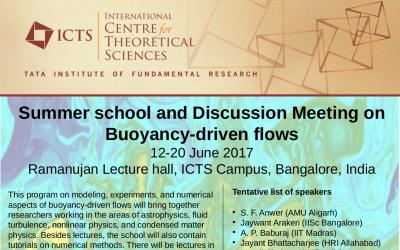Buoyancy plays a major role in the dynamics of atmosphere and interiors of planets and stars, as well as in engineering applications. This field has witnessed major advances in recent times in modeling, experiments, and numerical simulations.
This program on modeling, experiments, and numerical aspects of buoyancy-driven flows will bring together researchers working in the areas of astrophysics, fluid turbulence, nonlinear physics, and condensed matter physics. The program is planned as a 4 day school followed by a 5 day discussion meeting.
Beside courses of lectures, the school will also contain tutorials on numerical methods. There will be lectures in the discussion meeting on recent results by experts in the field. The aim of the discussions is to foster long-term collaborations among the participants. The topics of the discussion meeting include buoyancy-driven turbulence, Nusselt and Reynolds number scaling, flow reversals, atmospheric applications, rotating convection, etc.
Topics of the schools
- Rayleigh-Bénard instability and gravity waves, Nonlinear saturation, Turbulent buoyancy-driven flow and its phenomenology, Bolgiano-Obukhov and Kolmogorov scaling. - Mahendra Verma
- Theoretical development, Dissipative anomaly, Scale invariant solutions of the governing equations, Nusselt number scalings. - J. K. Bhattacharjee
- Experimental investigation of turbulent convection and buoyancy-driven flows in vertical tube, Boundary layers. - Jaywant Arakeri
- Buoyancy-driven flows in atmosphere , rotating and stratified flows. - Jai Sukhatme
- Numerical simulations, Finite difference scheme. - Richard Stevens
Schedule:
School at a pedagogical level for students and postdocs (12-15 June, 2017).
Discussion meeting with the participation of leading researchers in the field (16-20 June, 2017).
 icts
icts res
res in
in

